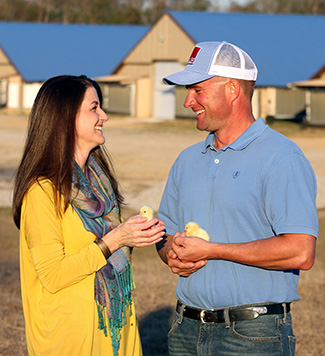Poultry Provides New Opportunities For Wiregrass Farmers

Two years ago, Josh and Jennifer Snellgrove jumped at the chance to join a growing number of farmers investing in poultry, Alabama’s No. 1 agricultural industry.
For years, the Coffee County couple, whose son, Trevor, is a student at Troy University, considered poultry farming. Construction of Wayne Farms’ new poultry feed mill near Ozark, only 20 miles from their farm, catapulted their dream to reality.
“We heard Wayne Farms was expanding, and at the same time Josh was looking for a new career opportunity,” said Jennifer, who works at First National Bank in Brundidge. “We filled out an application with Wayne Farms in February 2015 and had our first flock eight months later. Those eight months were a whirlwind of construction and learning all we could about the business. But it was an awesome feeling when that first flock arrived.”
Wayne Farms Chief Operating Officer Clint Rivers predicts the new feed mill will lead to 165 new poultry houses with an investment of $60 million by local farmers.
Josh said several of his friends are poultry farmers, and he’s heard others talk about joining the ranks.
“People are surprised at the electronics and advanced technology in today’s poultry houses,” Josh said. “There’s a lot to learn about the systems that control feed, water and the environment for the birds. Those things help us take good care of our chickens, but we still have to make sure everything is in working order.”
Josh said his biggest challenge was the transition to self-employment and adjusting to a paycheck that comes a few times a year instead of bi-weekly.
“The freedom and responsibility of being my own boss is also what I find the most satisfying and rewarding,” said Josh, who formerly worked for a regional utility company.
And it’s big business in Alabama. The state ranks second in the nation behind Georgia in broiler production, said Alabama Farmers Federation Poultry Division Director Guy Hall. Poultry and egg production, including processing, has an economic impact of $15.1 billion in Alabama.
“Poultry farming requires a considerable financial investment by farmers, but the industry has been good to our state,” Hall said. “Poultry provides diversification and works well with other farm enterprises like row crops and cattle.”
Alabama farmers raise more than a billion birds each year, and poultry is responsible for more than 86,000 jobs in the state, Hall said.
